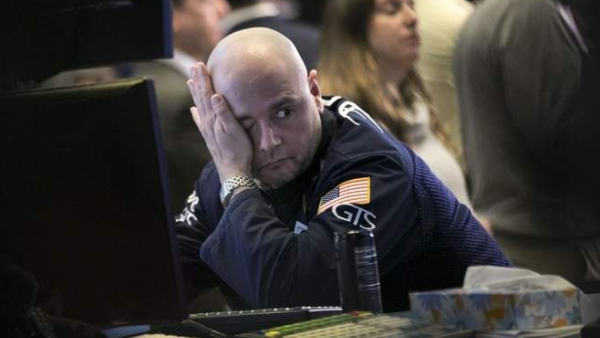After a 1,000-point midweek Dow rally, the US stock market was slammed again by 567 Dow points on Friday after President Trump announced $100 billion in additional tariffs on China and the March payroll growth number was a dismal 103,000 relative to the Wall Street consensus of 180,000.
Financial markets fear that the tensions between the US and China will escalate into a trade war that could well trigger a global recession. China has promised to "resolutely counterattack" against Trump's tariffs.
The American president's game of chicken over trade policy has clearly backfired with the People's Republic. Trade concerns hits companies with China exposure like Boeing, Caterpillar and Apple but also financials, since the shares of US money centre and regional banks fall when the safe-haven bid on hostile trade rhetoric flattens the US Treasury bond yield curve.
- US-China Trade Wars: Top 5 Things to Watch in Global Markets This Week
- Cryptocurrencies in UAE: Yes, No or Maybe? What You Need to Know
The March payroll data and moderate wage inflation data reduces the risk of aggressive Fed tightening, at least in the short run. The US stock market's valuation has now compressed from 18 to 16.7 times earnings. Yet the US tax cuts will boost first quarter corporate earnings growth, possibly to as high as 18 per cent annualised rate. A Wharton study has, however, calculated that a trade war with China will wipe out all the gains from Trump's fiscal stimulus. Mark Zuckerberg's testimony to Congress next week and Trump's anti-Amazon tweets still haunt tech shares.
Fear has now replaced greed as the dominant sentiment on Wall Street, with the Chicago Volatility Index up 90 per cent in 2018. Exporter-dominated stock markets like Germany, Sweden, South Korea, Japan and Taiwan fall in unison to trade fears, given the sheer scale and importance of the Chinese markets to them. In a world of economic interdependence, there is no place to hide. The risk of a US-China trade war justifiably unnerve investors, even though I am amazed that US soyabeans, corn, Kansas red wheat and cattle futures prices are up for 2018, not in free-fall. Commodities, unlike global equities, obviously do not price in the reality of a trade war.
Italy is also a source of risk for global markets given the failure of any political party to form a coalition government in Rome, a 130 per cent debt/GDP ratio, three failed banks, a 35 per cent youth unemployment rate and zero economic growth in a generation. No wonder 50 per cent of the Italian electorate voted for populist parties. There is also a non-trivial risk that the Republicans could be routed in the mid-term Congressional elections, thus guaranteeing legislative deadlock in Washington for the rest of Trump's term. As the Federal Reserve shrinks its $4.5 trillion balance sheet, the risk of a policy error by Chairman Powell on the path to monetary normalisation is also all too real.
The 10-year US Treasury note yield has risen from 2.40 per cent to 2.80 per cent in 2018 alone. Inflation expectations have also risen, due to a white-hot US labour market and a potential rise in Chinese import prices due to the tariffs. This means a bond market meltdown is inevitable.
As I search for mispriced asset classes, emerging market currencies stand out. Monetary tightening in Washington and Frankfurt makes emerging markets vulnerable to a trade war. As volatility has risen in 2018, emerging markets have remained relatively unscathed. The biggest risk lies in the Thai baht, South African rand, Taiwan dollar and Pakistani rupee.
Brazil's former President Lula de Silva has been sentenced to 12 years in jail for corruption and money laundering. This ends his 2018 presidential ambitions. Even though the real and the Bovespa rose once the supreme court's decision was announced, I would avoid Brazil assets for now. De Silva led the polls and it is likely a far-left populist candidate will emerge to challenge President Temer in October. The Sao Paulo Borsa will go ballistic at such a prospect, given the Bovespa's dramatic valuation rerating in the past two years. The Brazilian real is a short at 3.25 for a 3.70 target. The real had underperformed in 2017 on lack of progress on pension reform and the lack of a credible pro-growth candidate for president. This is a compelling argument to short the Bovespa at 85000, albeit with a tight stop.
This lodestar of global emerging markets now flashes an SOS to me, thanks to the three toxic T's of Wall Street - Trump, Tariffs, and Tech!
By Matein Khalid








